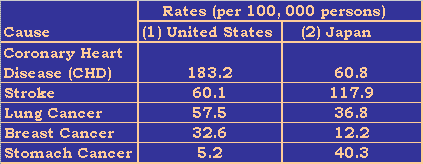Overview of Research Program by Director
First, I would like to express my sincere appreciation to the study participants, co-investigators and members of the board for their wonderful cooperation. Because our population-based epidemiological study requires a mass of people, we could not have achieved our goal without the people in Seattle and Japan who unselfishly spent their time to go through screening tests and the questionnaire.The Japanese are often assumed to be a healthier population generally than are Americans. The image of the Japanese as a fish-, vegetable-, and rice-eating people who are less obese than are Americans may have contributed to this assumption. Life expectancies for Japanese and American men, 76 and 72 years, respectively, and for Japanese and American women, 83 and 79 years, respectively, support this perception.Detailed comparisons of cause-specific death rates reveal that the relative health status of the two peoples is not so simple. For example, consider the death rates for specific causes of death in Japan versus the United States (Table 1). Why do such differences in mortality exist between the two nations? Are the differences caused by race (genetics) or the environment?
Table1. Comparison of mortality by selected causes between the United States and Japan.

(1)Trends of Nations Health (Kokumin eisei no doko). Health and Welfare Statistics Association, 1997.
(2)Monthly Vital Statistics Report: Report of Final Mortality Statistics, 1995. 45(11): Suppl 2, 1997.
The accessibility of Japanese Americans in the Seattle area suggested a strategic method for researching these issues. This group is genetically similar to the people of Japan, while substantially Americans in their environmental exposures.
The DPC’s current research is focused on three areas:
(1) cardiovascular disease and its risk factors,
(2) stomach cancer and its risk factors, including infection with Helicobacter pylori, and
(3) health services research including health care cost estimation for major diseases.
Tsukasa Namekata, Ph.D., Dr.H.Sc., F.A.C.E.
Director
Reference:
Namekata T, Genetics vs. Environment in Heart Disease and Stomach Cancer. Washington Public Health 1999; 16: 8-11.